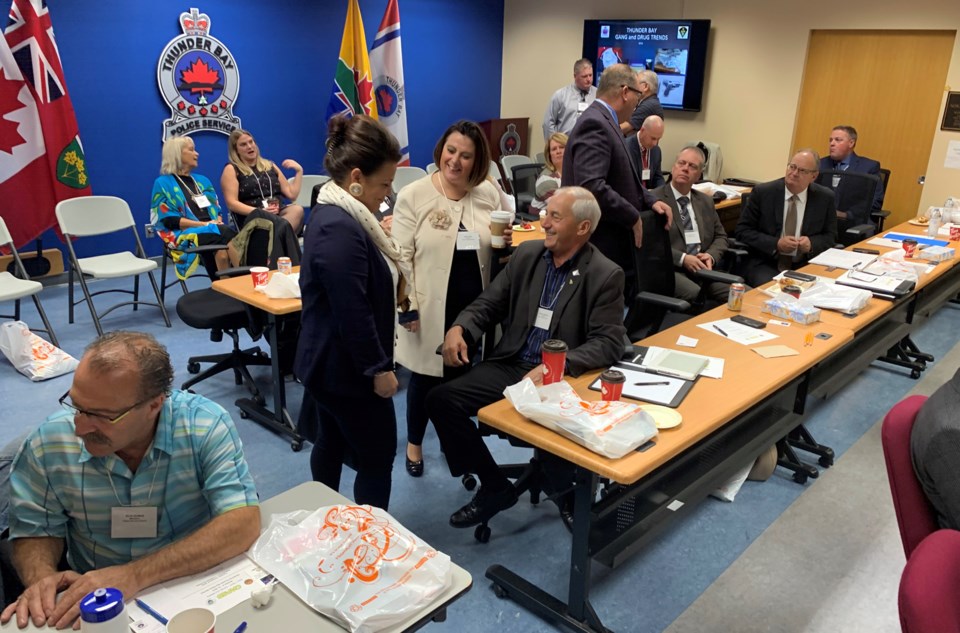THUNDER BAY - There are many challenges facing police services across the north but the recent influx of drugs, gangs, and gun related crime has left many struggling to keep up, and a lack of funding is making a difficult situation even worse.
“We need money,” said Thunder Bay Police Services Board chair, Celina Reitberger. “It’s unconscionable that the federal government would transfer $84 million to the province and they wouldn’t have any for Thunder Bay. We are in a unique situation. We need money to fight this problem.”
The Ontario Association of Chiefs of Police and the Ontario Association of Police Boards is hosting a joint Zone 1 meeting for police leaders and police board members from across Northern Ontario.
The Zone 1 area extends from Marathon to the Manitoba border and the annual meeting allows members from various services and boards to discuss strategies for addressing some of the most pressing issues facing police services in the North.
Thunder Bay Police Chief and Zone 1 director, Sylvie Hauth, said the joint meeting this year is focusing on issues that are the most timely and relevant, including guns and gangs, changes to the police services act, and on new community safety and wellbeing planning process.
But guns and gangs seems to be dominating the discussion, as well as a lack of funding to address the growing issue in the north.
“We need to come together as a Zone 1 area to really have a stronger voice both from the board perspective but also from all the chief’s perspective, to say don’t forget us in the northwest,” Hauth said. “What we have seen so far with the announcements being made is the money is being channeled into the GTA and that area.”
With a shooting taking place in the city Tuesday night, Hauth said it is a reminder of just how much of a problem guns and gangs are becoming for communities like Thunder Bay, and how lucrative the market is for illegal drugs.
“It was a good example for not only officers and police chiefs and board members in the northwest that this is happening, not necessarily on a daily basis, but almost on a weekly basis,” she said.
Hauth added that she will continue to advocate for funding to address these issues and the police service will continue to do what it needs to do to keep the community safe, including partnering with other police services outside the city.
“The reinforcement we have from other services is beneficial. We only have so many officers dedicated to drugs and gangs, so that partnership is vital and it is something we continue to do even without funding in place.”
Thunder Bay Mayor and Police Services Board member, Bill Mauro, said the type of crime and level of crime being seen in the city of Thunder Bay is different from anything that came before, but he hopes having a common voice from police services across the region will have an impact.
“I think there is commonality here with the people in the room,” he said. “As a group, we might be more successful in finding more assistance and best practice in moving forward. We have seen reductions in our funding for some programs provincially. We continue to advocate provincially and federally to try to get more assistance.”
Jeff McGuire, executive director of the Ontario Association of Chiefs of Police, was in Thunder Bay for the Zone 1 meeting. He said he will continue to advocate on behalf of the region for additional funding, but he recognizes it has been a bit of a sore spot for the north.
“I think the government had the right intentions,” he said. “There were serious guns and gangs issues going on at that moment in Toronto and GTA area. Members of OACP were quick to point out it’s not just a GTA challenge.”
“The government has listened and I believe there will be more funding that will be available to help assist with guns and gangs across the province,” McGuire continued. “It is a challenge. At the beginning I think what was a best intention caught others by surprise who asked: where is our money?”
But McGuire added that guns, gangs, and drugs is not a problem the province can simply throw money at and expect to go away because there are other issues at play, such as mental health, poverty, and access to firearms.
“The money is not going to solve the problem instantly at any rate,” he said. “We will continue to advocate for where we think the money needs to be. But it’s not just a matter of throwing money. And it’s not just a policing issue.”
By for Police Service Boards here in the north, additional funding would be an important step in addressing the increasing violent crimes plaguing the streets.
“One of our coming efforts on behalf of the board will be to go to the government and say: show us the money,” Reitberger said. “We are not stopping our advocacy on behalf of the service to get more money because they need it desperately.”
